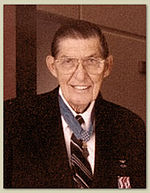
wiki
In the spring of 1944, the focus of the American army in Europe was the fighting in Italy. Van Barfoot was a sergeant in the 157th Infantry, part of the 45th Division. The 25 men in his platoon, like the other 150,000 Americans on the beachhead, had been bombed and shelled regularly by German aircraft and artillery since they arrived at Anzio in February.
Their world was compact. Just in front of Barfoot’s position was a wheat field; in the middle of the field was a cemetery whose walls had been destroyed by shelling. A mile away was the Campoleone-Cisterna railroad and the town of Carano. Just behind them was a small pine forest, the Padigliano Woods, and beyond that the ocean. There was only one way to go: through the Germans. “We knew we would have to break ourselves out of there,” he said. “Because the invasion force for D-Day was sitting in England and no one was coming behind us.”
The order to move came on May 22nd. A naval bombardment preceding the assault started at 5:45. A light rain was falling at 6:30 when Barfoot moved his platoon out of their position through the irrigation ditches towards the German lines. The platoon’s radio was damaged by machine gun fire, so Barfoot couldn’t call to coordinate his movements or ask for artillery support. He tried to send a runner to contact the company commander but the runner was wounded before he could leave their position.
They had lost contact with the unit on their flank. Even amid the hundreds of thousands of German, British and American troops fighting and dying on that spring morning in Italy, Barfoot and his unit were isolated, alone. Barfoot left a squad in position where they could see the Germans and continued alone up the ditch towards the German machine guns.
The weeks of training and reconnaissance paid off, Barfoot had made it through the irrigation canals and was just in front of the German positions. But the rest of his platoon was pinned down by German machine gun fire. He crawled through the ditch until he was about 20 feet from the three German soldiers and the machine gun. He destroyed the gun and killed the German soldiers.
He couldn’t see his platoon, but assumed they were maneuvering behind him and that they could see him. The company on their right was bogged down, working its way slowly through a minefield, so Barfoot’s unit was exposed on their flank.
He came up behind a second machine gun. He killed the three men at that position, shooting them with his sub-machine gun. “I couldn’t communicate with my men, so I just kept on going,” he said. When he reached the third position, the Germans simply stood up and surrendered to him.
The Germans there knew that the others had surrendered, and they did, too. It was about 9:30. It had taken three hours to get there. Along the way he had silenced three machine guns and captured 17 German soldiers.
Then the Germans tanks arrived. “I only saw two, but someone else reported three,” he said. Their fighting positions only partially completed, the platoon leader ordered the men to withdraw to a hill just behind the trestle. Barfoot stayed behind with a small team. He took a rocket launcher from one of his men and, he says, “found a nice clear position for a head on shot” with it. At this point, he was face to face with a German tank about 50 yards away. He fired the bazooka and missed. He reloaded.
The second shot hit the tank’s treads, sending it out of control and into a ditch. The crew came out of the tank and, “Unfortunately, the only thing I could do,” he said, “was to eliminate the crew.” The other tanks turned away.
The unit on his right was still caught up in the minefield, and the battalion commander needed to consolidate the lines—to bring all his units into line to close any gaps the Germans could exploit. Barfoot’s platoon was ordered to withdraw from the railroad trestle. He helped two wounded men back to the battalion rear area, a distance of about a mile. Then returned to his platoon to help organize the men for their next day’s fight.
Van Barfoot was was awarded the Medal of Honor for his actions that day in Italy. He died on Friday in Richmond, Virginia, at the age of 92. I spoke to him about his exploits. If you want to learn more about an American hero, click here.


